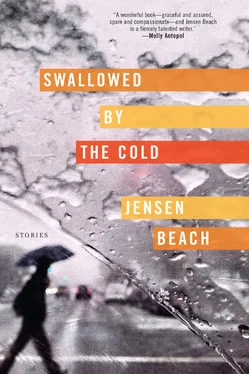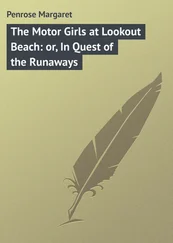“I keep interrupting you,” the woman said. She looked up from her book and turned it so that it faced Lennart. “But am I reading the map properly? I think I am but it’s hard to tell. All the water. And the jet lag. I slept all morning. Coming this way, east I guess it’d be, is the worst.”
He pushed his phone and the newspaper out of the way so the woman could place the book in front of him. “What are you trying to find?” he said. He knew the city well. Here was a problem he could fix.
The woman pointed to the map. “The Vasa Museum,” she said. “That’s it there, right?” She tapped her finger on the map and then pointed across the bay, leaning to try to see the museum. Lennart didn’t think it was possible to see it from this side of Skeppsholmen, even from high up at the terrace.
“Yes,” said Lennart, a little disappointed that what she was looking for was close, so easy to point to. “It’s just beyond the island there, the larger of the two. You can’t see it from here, but it’s on the far side. Can’t miss it.” He had meant to suggest that he take her there himself later that afternoon, but now that he’d explained how easy it was to find, he’d need to come up with something better. The Vasa was accidentally rediscovered when the channel in the bay was dredged to accommodate the increasingly large cruise liners that came in and out of Stockholm. Centuries of mud and silt preserved the ship and now, exposed to the air, it was slowly crumbling.
“I’m only here for a week,” the woman said. “Would you recommend touring? I’ve already been to a number of museums.” She didn’t wear any jewelry and had slender fingers that moved quickly from object to object in a way that Lennart thought was inelegant but attractive. He’d been to the Vasa many times. The ship rested on a group of metal pylons arranged at the bottom of a dry dock in the center of the building. The main hall always smelled damp, thick with tar. The ship was remarkable in size, but only because it was indoors and so old.
“I haven’t been in years,” he said. “My father took my sister and me to the opening—1989, that must have been.” The Vasa sank in 1628 on her maiden voyage. He’d always remembered historical dates easily but not those from his own life. One summer when Lennart was a boy, not long after the trip with his father, a heavy storm had hit the island where his father had his summerhouse and flooded the house, seawater reaching all the way inland to the village that straddled the canal between the island and the mainland. He remembered the rain lasting days. The night after his father died, Lennart had been unable to sleep. What kept him awake wasn’t the grief of losing his father, at least not exactly. It was the question of whether the storm had occurred the summer before or the summer after his parents divorced. He’d been at the house, he thought, but had his father? Had his mother? The storm held greater symbolic meaning if it happened the year before the divorce, but he couldn’t be sure he wasn’t forcing that meaning to exist where there was none. But what difference did it make? The storm was neither a sign of things to come, nor the result of the past. It was heavy rain and waves that broke high on the shore, flowed into the house, carried his father’s boat away. There was no meaning. It just happened.
“It must have been quite the ordeal,” the woman said.
Obviously, she meant the museum opening itself, not his father’s having taken him to it, but the inclination to respond literally itched coarsely in his throat. He tried to recall if it had been an ordeal. There must have been some sort of celebration, but he couldn’t locate a clear memory of the day he’d gone, and his father disliked crowds so it was unlikely they’d gone to a ribbon cutting or a parade. For as long as Lennart could remember, the fact that he had gone to the opening of the Vasa Museum had been a fact of his life. To revisit the memory had never occurred to him. “I guess I don’t remember,” he said.
The woman looked down at her guidebook and Lennart followed her eyes to an image of the three familiar stylized masts rising from the boxy red building. “The architecture looks gorgeous,” she said “Where I’m from in Chicago there are tours you can take just to learn about architecture. I’ve never been but I hear they are very informative.”
“I don’t think we have anything like that here,” Lennart said.
“No,” the woman said as if to confirm the fact. “That’s too bad.”
Lennart’s phone buzzed again. A text message from his sister: “Where are you? We’re waiting. M & U are pissed. Answer me?” He deleted the message.
“What do you do?” the woman asked suddenly. Though he lived in the United States for a long time, it always took him a moment to understand that when Americans asked this they were asking about work.
“I’m an engineer for a mobile telephone company,” he said, a little disappointed he hadn’t thought of something else to tell her, art historian, gastroenterologist, minister of education, anything.
“And you’re skipping out on work?” she said, starting to laugh. “That must be why your phone keeps ringing.”
“Summer holiday,” he said, raising his glass. “I have full permission to drink during the day.”
She raised her empty glass at him. Beyond her he could just make out the small figures of people lined up in the glass-walled gangway attached to a cruise ship’s hull farther down the wharf. On the water, there were ferries and motorboats. It was a nice day to be out on the water. In North Carolina, he’d once been in love with a woman who’d claimed people have eleven senses. Everyone was mistaken that there were only five, she’d told him. It was so limiting, so inhuman. There were four different types of touch: pain, cold, pressure, and heat. Then there was taste, sight, hearing, smell, balance, and acceleration. And finally kinesthetic sense, which is the ability to locate various body parts (the shoulder, for example) when not looking at them. His phone buzzed.
“Working vacation?” He watched her eyes dart quickly to his empty beer glass and then back up to him.
“It’s nothing serious,” he said. “Just something I don’t want to do.” Once, he must have been in fourth or fifth grade, he told his friend Conny that his father beat him. He’d wanted to see how Conny would react. Lennart often lied just to see what might happen.
“Turn off the phone. Enjoy the day,” the woman said. She raised her glass, sipped from it, and looked away.
Lennart turned toward the bar, looking for one of the waitresses so that he could order drinks. “You’re right,” he said and turned back to the woman. He felt the gentle rub of the alcohol brush against the inside of his stomach, rising pleasurably. He was happy and hopeful about the afternoon, and about his father, and his siblings. Let them wait, let them make a decision for once. He turned to the woman and said, more weakly than he’d meant, “Perhaps I can show you the museum.”
“Look at that,” the woman said. She pointed to the water with her empty wine glass.
In the bay, only a finger or two from shore when seen from the distance of the terrace, a passenger ferry had caught on fire. Flames clawed the fore section of the boat. They jumped and pulsed, lipped over the top of the pilot’s cabin. A steady cloud of black smoke rose up and outward, obscuring parts of the ferry and the passengers racing madly across its decks. Lennart was surprised he’d missed the commotion until then. Gusts of wind pushed the smoke toward land, forming a long tubular cloud. He leaned forward across the table toward the woman for a clearer view. “I hope no one’s hurt,” she said flatly. “It looks bad.”
Читать дальше











